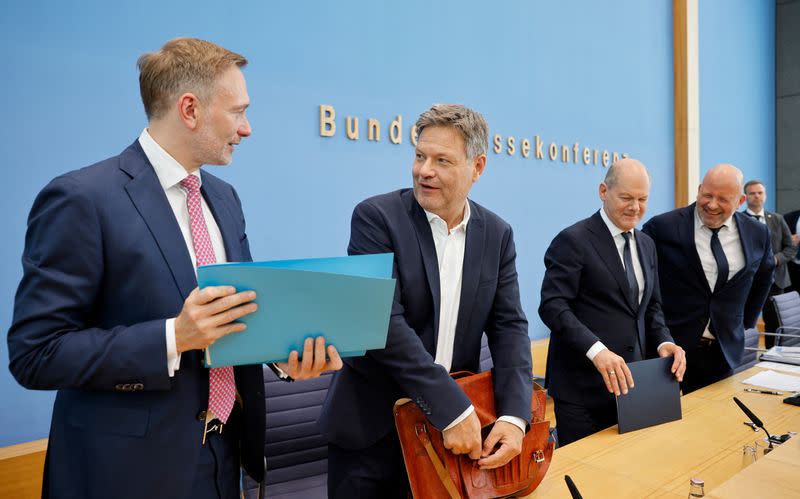Factbox-How the German coalition wants to bolster economic growth

(Reuters) - Germany's coalition government clinched a 2025 budget deal on Friday that aims at revving up stuttering economic growth and financing a massive military overhaul to meet NATO targets while still honoring the country's tight borrowing rules.
Here is an overview of the agreed "growth initiative", which will be presented to parliament in the form of draft legislation on July 17.
ECONOMIC GROWTH
The coalition hopes that the measures will lead to additional growth of more than half a percentage point in 2025. That would be almost 26 billion euros ($28.13 billion) in additional economic output. Over the next four years, the increase would add up to 1.6% of gross domestic product.
WORK INCENTIVES
The plan includes incentives for people to work more and beyond their retirement age - an attempt to tackle Germany's skilled labour shortage that has been a drag on growth. Employer contributions to pension and unemployment insurance will be paid out directly to employees who already receive pension payments.
According to the coalition, this will mean a net increase of around 250 euros per month on average. There will be tax incentives and bonuses for working longer hours.
The initiative also provides for changes to Germany's so-called citizens' benefit for the unemployed or those on low incomes. The long-term unemployed will now retain a larger proportion of their earnings in the first year after re-entering the workforce, without the amount being deducted from their housing benefit.
WORKFORCE
The coalition aims to make it easier for migrants - including latest waves of refugees caused by wars in the Middle East and Ukraine - to enter the job market.
It promises to remove bureaucratic barriers for companies looking to hire foreign workers and to extend privileged access to the German labour market granted to six Western Balkan states. Furthermore, permits for temporary work are to be allowed, subject to clear criteria to prevent wage dumping.
To attract skilled workers, the government proposes that in the first three years after arrival 30%, 20% and 10% of gross salaries, respectively, will be tax-free.
TAX CHANGES
The income tax brackets will be adjusted in line with inflation for 2025 and 2026, which will represent a relief of 23 billion euros for the taxpayers.
Child and basic tax-free allowances will be increased for 2024 and 2025, and child benefits will be increased at the beginning of 2025.
CUTTING RED TAPE
All federal ministries will be required to check for bureaucratic hurdles and reduce red tape. In addition, the European Supply Chain Directive is to be implemented with as little bureaucracy as possible before the end of the legislative period.
To support small businesses, the initiative aims to streamline data protection, for example by raising the threshold for a mandatory position of a data protection officer.
The coalition also plans to simplify and speed up export controls by introducing easier procedures and hiring more staff.
ENCOURAGING INVESTMENT
The coalition will extend until 2028 a scheme that allows companies faster depreciation of their assets and therefore reduce their tax burden.
In an effort to support the green transition, the government will offer tax incentives for the purchase of commercially used electric cars.
There are also plans to set up a fund dedicated to small and medium enterprises, and to improve conditions for venture capital investments.
ENERGY PRICES
To ease the burden on industry, the coalition will extend until 2030 an agreement reached last year on a package of measures to support industry in the face of high electricity prices.
The government also promises to permanently reduce the electricity tax for current beneficiaries to the EU minimum and extend its electricity price equalisation scheme until 2030.
($1 = 0.9241 euros)
(Reporting by Klaus Lauer; Writing by Chiara Holzhaeuser; Editing by Maria Martinez, Friederike Heine and Tomasz Janowski)

 Yahoo Finance
Yahoo Finance 